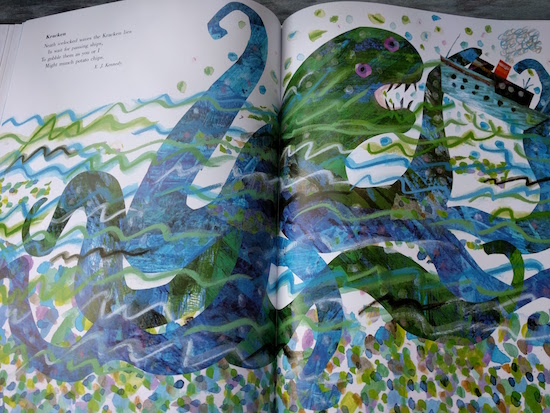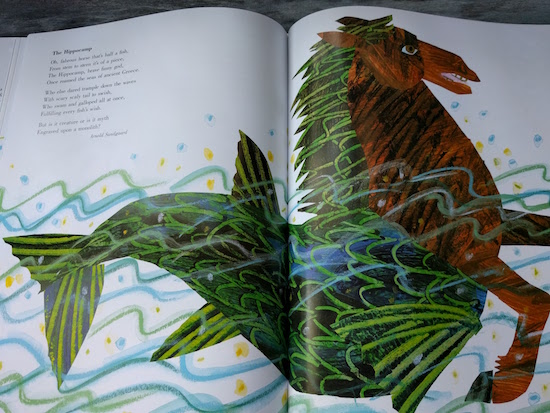June 28, 2016
White Elephant, by Catherine Cooper
 There is a way to get around the problem of writing about white people in Africa, which is by making them abjectly horrible. White people who are coming to Africa in order to “help,” no less, the latest chapter in centuries of colonialism. In Catherine Cooper’s debut novel, White Elephant, the African country is Sierra Leone in the early 1990s, on the cusp of its brutal decade long civil war. Dr. Richard Berringer has arrived to fulfil a long sought dream of working in Africa, helping and healing, along with his wife, Ann, and their son, Torquil. Except that Ann is wretchedly ill, their son is miserable, and Richard is failing to connect with his patients in the way he desires. His attempts to educate them about female genital mutilation and treating illnesses with the local herbalist fall go unregarded, and his views invite hostility from his colleagues who protest that he doesn’t understand the implications of his words and actions. And we see that a failure to work well with others has troubled Richard before, in fact it’s partly what drove him to Sierra Leone, after falling out with another doctor with whom he shared a practice. Not to mention the affair which made him a target of gossip back home in their Nova Scotia community, where he and Ann had been subject to too much attention already thanks to the ostentatious house she’d had built for them and spent so much time and money decorating. Except that once they’d finally moved it, it had been here where her illness had started, something growing in the walls, she thought—mould? The problem driving her mad to the point where she was closing off rooms and/or hacking through the walls, and then news of her husband’s affair had thrown things into a further state of disarray, and it was around this point where they made the move to Sierra Leone—isn’t it amazing that these people would think they’re in a position to help anybody?
There is a way to get around the problem of writing about white people in Africa, which is by making them abjectly horrible. White people who are coming to Africa in order to “help,” no less, the latest chapter in centuries of colonialism. In Catherine Cooper’s debut novel, White Elephant, the African country is Sierra Leone in the early 1990s, on the cusp of its brutal decade long civil war. Dr. Richard Berringer has arrived to fulfil a long sought dream of working in Africa, helping and healing, along with his wife, Ann, and their son, Torquil. Except that Ann is wretchedly ill, their son is miserable, and Richard is failing to connect with his patients in the way he desires. His attempts to educate them about female genital mutilation and treating illnesses with the local herbalist fall go unregarded, and his views invite hostility from his colleagues who protest that he doesn’t understand the implications of his words and actions. And we see that a failure to work well with others has troubled Richard before, in fact it’s partly what drove him to Sierra Leone, after falling out with another doctor with whom he shared a practice. Not to mention the affair which made him a target of gossip back home in their Nova Scotia community, where he and Ann had been subject to too much attention already thanks to the ostentatious house she’d had built for them and spent so much time and money decorating. Except that once they’d finally moved it, it had been here where her illness had started, something growing in the walls, she thought—mould? The problem driving her mad to the point where she was closing off rooms and/or hacking through the walls, and then news of her husband’s affair had thrown things into a further state of disarray, and it was around this point where they made the move to Sierra Leone—isn’t it amazing that these people would think they’re in a position to help anybody?
The story is told in chapters moving between the three members of the Berringer family, each of whom is perfectly terrible in his or her own way, eternally casting themselves as victims of their tale. Each of these people is also very hard to like, to sympathize with, Cooper making clear that these aren’t meant to stand for ordinary people but are each their own personal brand of awful. Solipsistic, oblivious to how they are perceived by others and of their effect on the world around them, short-sighted, cruel and mean. On one hand, all of this can get to be a bit much—Ann and Richard are so loathsome it’s a bit hard to fathom how they ever even liked each other once upon a time. But on a symbolic level, it’s perfectly apt, and attests to the inherent self-interest of white people turning up in Africa ever since white people started turning up anywhere.
The story is a little bit too long—there is so much action in the present day as the story moves toward its climax, and then all the details of the past are all drawn out in flashbacks, and it takes a little while for momentum to build. But once it begins, the story is quite gripping, these terrible people hurtling toward their inevitable disaster. The consequences of Torquil’s usual troublemaking have higher stakes in an area that is slowly becoming a war zone, soldiers patrolling checkpoints nearby, plus Ann finds her place about zealous missionaries and decides adopting an orphan would make her into the kind of person she wants to be, and Richard’s determination to provide medical care to a girl who’s been accused to witchcraft has results far beyond what he’s expected. Against all this drama, the three are grappling with more ordinary questions about love and family and marriage and home—and then there’s those threatening letters from Canadian Revenue. The only thing sure (although none of them see it) is that the end isn’t going to be pretty.
June 28, 2016
Book Publishing: The Long View
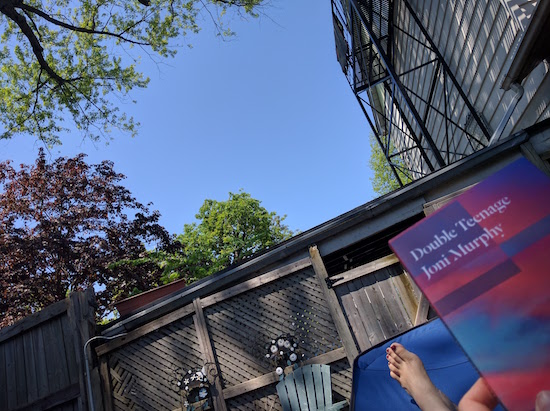
Yesterday I responded to a tweet by Joni Murphy (remember Joni Murphy? She wrote the wonderful novel Double Teenage that I devoured last month) about the ridiculously small window of books coverage in the mainstream media. She’s absolutely right—once the “new release” glow fades, so does a lot of interest…but I suggested that this doesn’t matter. I mean, yes, it would be altogether excellent to find oneself on a bestseller list the week one’s book was published, and for the momentum to be undeniable and inexhaustible, and to have your book be everywhere. Yes, authors do need to work and hustle to get the word out for sure. But here it is: you can only do the best that you can do. And even that is not really guaranteed to get results. And so what an author really needs to do is be satisfied with immediate coverage, but also keep the long view, and have faith in the book and its readers.
For sure, this kind of faith is not the stuff of bestsellerdom, but ultimately it is what really matters. It’s the difference between your book living on someone’s bookshelf for years and years, and being put out on the curb. It means your book not being available en-masse at secondhand bookstores six weeks after the pub date (and hello copies of The Nest and The Girl on the Train. I see you!) It means real people connecting with your work rather than just hearing about it, knowing the cover. The thing about books, good books, see, is that they have long lives, even if it’s hard to measure just how. Although the most excellent thing about the internet is that we do have some kind of a record now, a way of registering reader responses long past the on-sale date. (“The standards we raise and the judgements we pass steal into the air and become part of the atmosphere which writers breathe as they work,” writes Virginia Woolf in her 1925 essay “How Should One Read a Book,” anticipating the literary blogosphere[s]). It would be really wonderful to write a book that set the world on fire, but it’s just as stunning for me as a writer to discover, say, that my book is still being picked up and appreciated over two years after it first was published.
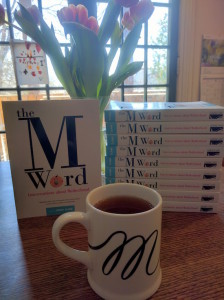 My point proven by two things that happened after my exchange with Murphy: last night I discovered a blog post from last month by the fantastic Red Tent Sisters (who I met when they were at our book launch way back when…) called “Why Is Mothering so Difficult?” It’s a terrific post, but I was even more thrilled by their suggestion that reading a book like The M Word might make mothering a little bit less difficult. They’ve also included The M Word on their Top Fifty Beautiful Books for Soul Sisters, which you can receive if you sign up for their newsletter (and here’s a tip—if you put somebody’s book on a list they receive if they sign up for your newsletter, that somebody will ALWAYS sign up for your newsletter). So I was feeling pretty good about that, and then this morning I was tagged on Instagram by a woman called Leah Noble with a gorgeous photo of The M Word alongside a just-as-delicious-seeming breakfast. Two signs from the universe that the book goes on, after a while of radio silence. Yes, both readers are connected with writers in the book, so I’m not suggesting that the whole thing is made from fairy dust, but there is an element of serendipity about it. You really do have to trust that the book will find its way—and the good books really will. Even if sometimes the ways are small and quiet.
My point proven by two things that happened after my exchange with Murphy: last night I discovered a blog post from last month by the fantastic Red Tent Sisters (who I met when they were at our book launch way back when…) called “Why Is Mothering so Difficult?” It’s a terrific post, but I was even more thrilled by their suggestion that reading a book like The M Word might make mothering a little bit less difficult. They’ve also included The M Word on their Top Fifty Beautiful Books for Soul Sisters, which you can receive if you sign up for their newsletter (and here’s a tip—if you put somebody’s book on a list they receive if they sign up for your newsletter, that somebody will ALWAYS sign up for your newsletter). So I was feeling pretty good about that, and then this morning I was tagged on Instagram by a woman called Leah Noble with a gorgeous photo of The M Word alongside a just-as-delicious-seeming breakfast. Two signs from the universe that the book goes on, after a while of radio silence. Yes, both readers are connected with writers in the book, so I’m not suggesting that the whole thing is made from fairy dust, but there is an element of serendipity about it. You really do have to trust that the book will find its way—and the good books really will. Even if sometimes the ways are small and quiet.
And here’s another thing that I discovered last night, the other side of the publishing coin, eight months before the release date. My novel Mitzi Bytes is now available for pre-order, and unless I have a rabid superfan I am unaware of, my sister purchased the very first copy last night. But this doesn’t mean that it’s too late for you: you can pre-order the book at Chapters Indigo, or from Amazon, or head over to your local proper bookshop to do so.
(But my point is that even if you don’t, it doesn’t fundamentally matter. Life is long and good books are even longer.)
June 26, 2016
Happy Days
Friday was also my 37th birthday, which kicked off with a visit to the bank. Okay, that’s not completely true—I woke up and as per family tradition, people and presents were piled on my bed and I got to open the latter, which included bath things, a new robe, a beautiful shirt, and the book Mad Men Carousel, which means I now get to read my favourite television show over and over again instead of only just watching it. It all was wonderful, but then we had to get going, get the kids to school, and there was that meeting at the bank which was just a quick one because I had some papers to sign. My favourite thing about my bank is free WiFi and so as I sat there in the nondescript office and waited for pages to print and details to be sorted, my phone kept buzzing, email, Twitter and Instagram, so many excellent people sending me wishes. My best friends, old friends, online friends, and more friends—it was overwhelming. I am so incredibly grateful for the people who make my world. One in particular…

Which would be the one who orchestrated the post-bank events. He was working from home so was there to answer the knock on our door just past 10am, when a taxi arrived delivering scones and jam from Baker and Scone, the scones still warm from the oven. Lavender scones, no less. And then another knock at the door, more friends, and there was champagne and orange juice, and a fruit tart, and so much goodness. It was amazing. What a way to spend a Friday morning—and then after I went to fetch Iris at noon, I spent the afternoon reading in my hammock. (It is also nice to be out and about with Iris, who insists on telling everybody that it’s my birthday, so that I get to be celebrated and still look cool.)
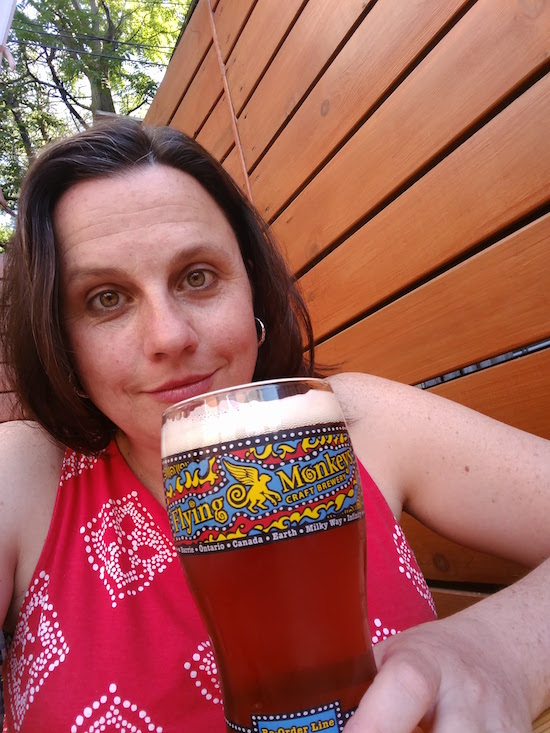
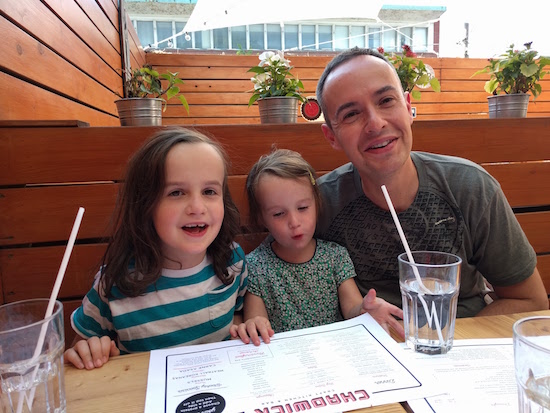
That night we went to Chadwicks for dinner, and had a delightful time on the patio. Reminiscing about all the good times we’ve had there over the years—like the night that Iris discovered she had feet. And then coming home to ice cream cake, my favourite (and even better: there’s still some in the freezer right now).
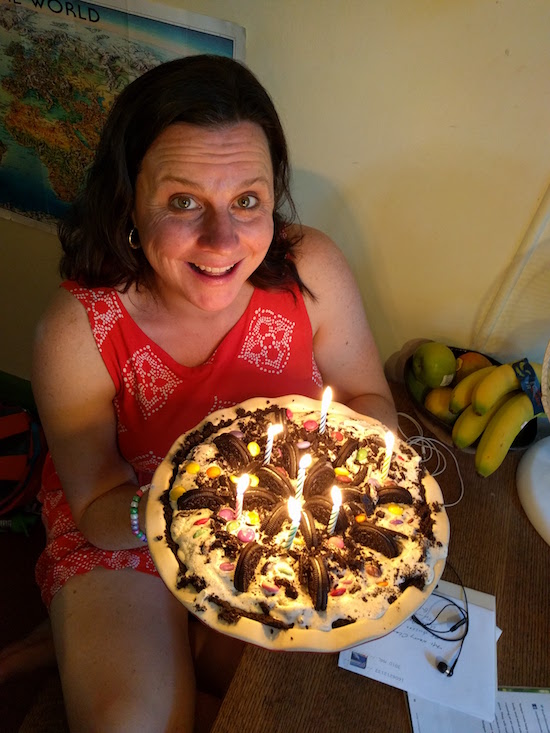
We spent Saturday morning in High Park with friends for a spectacularly catered sixth birthday party, and then drove out of the city after lunch for the final lag of my birthday celebrations. Driving to Uxbridge, ON to visit Blue Heron Books—remember my first visit there two years ago? Although we stropped for gelato first and then made our way to Blue Heron, which now has an adjoining teashop, which is only good news.
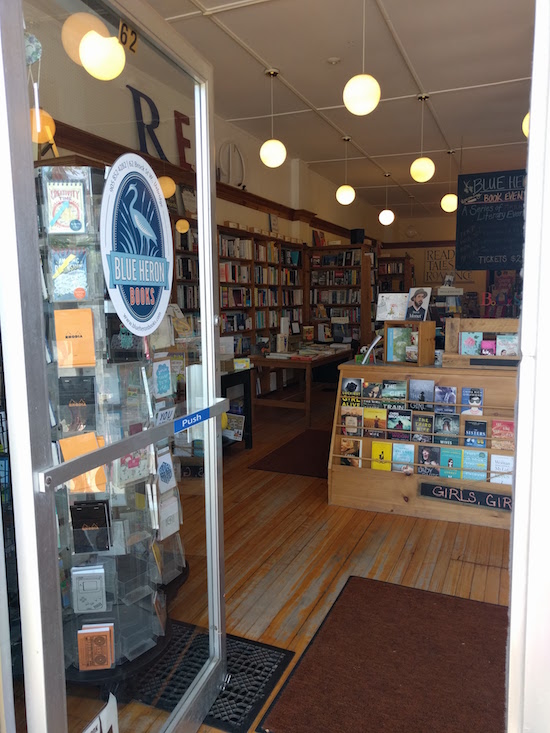
The door was open and the shop was beautiful. I loved their displays, personal recommendations, the chairs, and selection. I browsed and explored, picking up titles that caught my eye. I managed not to buy every single one, although I got a few of them. It was a wonderful way to spend an afternoon. I only returned to the cash one more time after my initial purchases. And then we made our way to the park and hung out in the shade on the grass, before heading to Urban Pantry for a ridiculously delicious dinner (with cake pops, no less). The ride back home was peaceful and nobody cried, and there is this one spot on Bloomington Road where we could see the city, small but entire, faraway over the green fields, and all of us gasped in awe.
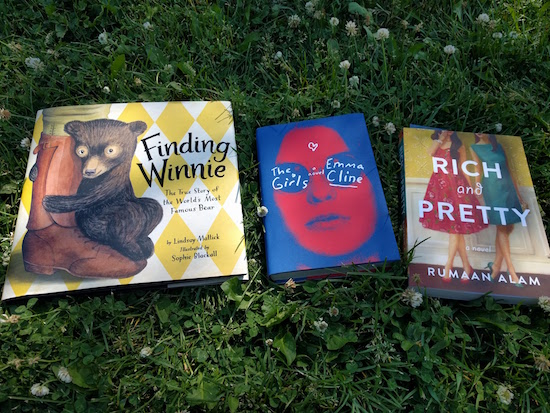
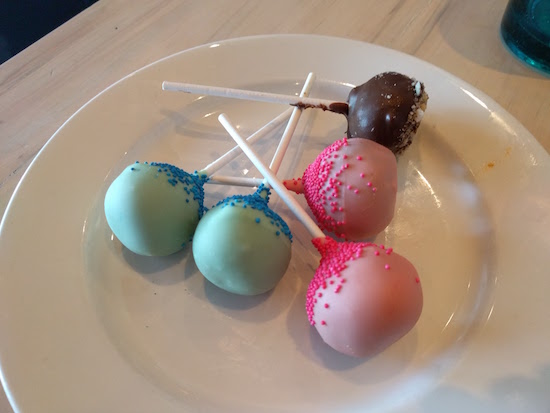
June 26, 2016
Heavy Hearts
It’s all very heavy, it is, and then my children keep getting sick, and we keep starting off weekends with a such a bang that we’re destroyed by Sunday, and it’s so hot. I remain stuck inside a reading rut. The UK referendum weights heavily upon me too, because I love England, and it once was my home, and it gave me a husband plus two children who would have been EU citizens, but not anymore. It’s the irrevocability of it all that gets me. And I think about my friends and family in England, people in their 30s and 40s who are in the beginning of the middle of their lives, raising families and making a world for themselves, and they awoke Friday morning to discover that world wasn’t what they thought it was. I think about the anomaly of the EEC and EU eras compared to the bloodbath that has been the rest of European history, and it scares me. Not that I think that everything will be not be okay in the end, but I think it’s unfortunate that the standards of “okay” will have to be lowered. It’s about legitimizing racism and stupid nationalism, and voters who are well intentioned but really should have been more careful about who they were aligned with.
My feelings are well articulated with this meme: “..whilst I appreciate that, just as I did, you chose your vote based on what you thought was for the best, you have precipitated a huge financial collapse, destabilized my country, and threatened the future of my children, and it’s hard for me to forget that, especially within a matter of hours.”
As Margaret MacMillan writes, and she knows more about what all this means than anyone does (and if you think she doesn’t, you are ignorant): “the Britain of the future will be smaller, poorer, possibly meaner, and certainly less relevant in the world.”
June 20, 2016
Things To Be Grateful For
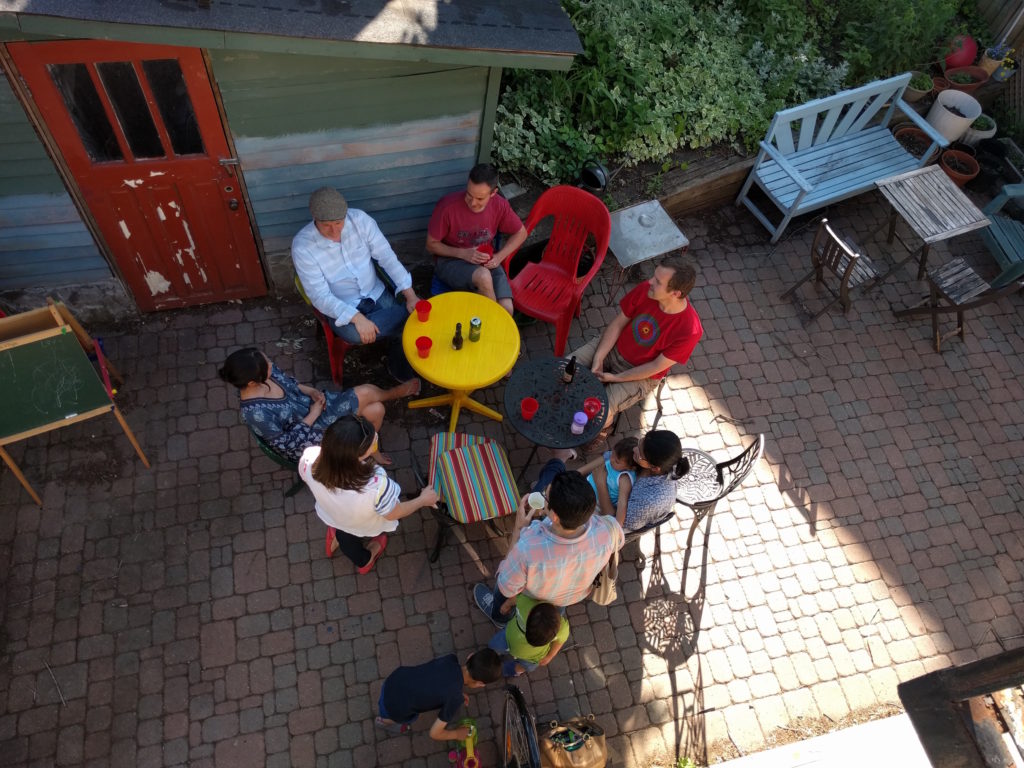
1. On Thursday night, I emailed good friends in the neighbourhood and told them I was feeling spiritually disheartened. “What would really make me feel better,” I wrote, “would be if you came over and drank beer in my backyard tomorrow night and ate pizza.” That I have good friends in my neighbourhood to whom I can make such requests is something to be grateful for. That everyone said yes is another, and they all rolled up the next evening, their children in tow, and we drank far too much in our beautiful backyard under the shade of the majestic silver maple (which is actually a character in my novel, by the way). It was a perfectly wonderful evening underlining our family’s enormous wealth in terms of friendship. Which is the greatest kind of wealth a person could ever hope for.
2. I am grateful to Maggie Smith’s poem, “Good Bones”, which I read around the table on Friday night (either before or after I started singing a karaoke version of “How Will I Know?” on my phone. I cannot recall exactly). I am grateful that such a poem exists, and that it went viral, and that poems go viral at all. A neat thing is that tomorrow signed broadsheets of the poem go on sale with a portion of proceeds going towards a group supporting LGBTQ youth in Orlando. I think details will probably be here.
3. I am grateful for a Saturday spent hungover but not painfully so, when I got to read two whole newspapers and Amy Jones’ novel in my hammock.
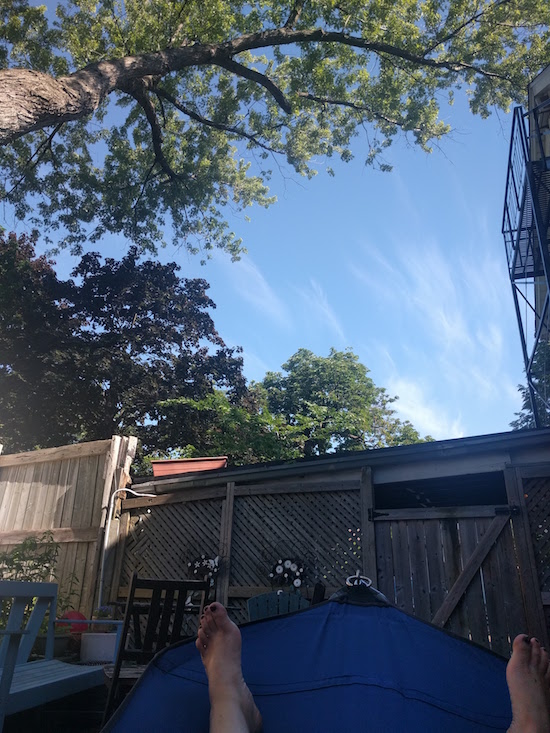
4. I am grateful to be able to celebrate 11 years of marriage with my excellent husband, who I like and love so much more than I did on our wedding day, and I was certainly fond of him them. I feel so blessed for all the time we’ve had together and the history we’ve created, and I look forward to the future and all the time ahead…and it will never be enough.
5. I am grateful that when our littlest daughter threw up in the restaurant at Father’s Day Brunch, she did so fairly discreetly and that we were able to get the food packaged to go. And that even though Father’s Day really did totally suck, that my children’s father didn’t sulk as much about that as I might have in his shoes. I am also grateful that I have learned to be a better partner by thinking about the hypothetical ways he’d support me in a given situation and sending such support his way. I like that he makes me a better person.
6. I am grateful that no one has vomited on me since 4am this morning. And that when Iris stayed home from school today, she spent the whole day sleeping and I got so much work done I wouldn’t have done other circumstances and she woke up feeling better. We’re hoping for a better night’s sleep tonight.
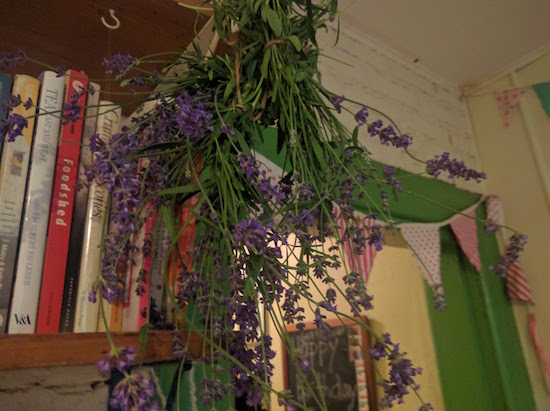
7. I am grateful for the thoughtfulness of blogs. I am so grateful for Rebecca Woolf, Shawna Lemay, Sarah from Edge of Evening, and Lindy Mechefske, and so many others… I think that the thoughtfulness and nuance implicit to blogging have never been more urgent (and if you write a post with tips about engaging with brands, I will unfollow you).
8. I am grateful there is such a thing as lavender. And fifteen ways to use it.
9. I am grateful for the news clip I heard tonight on As It Happens as British MP Rachel Reeves delivered a tribute to her murdered colleague, Jo Cox, and talked about the woman she’d encountered in a coffee shop this week who’d said she’d never met Cox but that learning about her life made her want to be a better person. I imagine that sentiment is widely shared. I think this is excellent and true.
10. And finally, I am grateful that the heat of the day has finally broken, and for the fresh breeze drifting through the window right now.
June 19, 2016
We’re All In This Together, by Amy Jones
 I’ve been having trouble focussing lately on the books I’ve been reading, and I’ve not been sure if the problem has been the books or my lack of focus…or a combination of both? I was hoping for a diversion, however, when I picked up Amy Jones’ debut novel, We’re All In This Together, which became a bestseller when it was published last week. You might remember Jones from her first book, the short story collection What Boys Like—and my interview with her from around that time is really wonderful to read again all these years later. (I recall spending ages transcribing it and then I pretty much never did an actual spoken-word interview ever again. Which is definitely too bad, but not entirely for my mental health.) The novel has received fantastic reviews and I’ve been looking forward to it, although when I first started reading I wasn’t convinced it was going to take. It’s a set-up similar, I thought, to books I’ve read before, books like The Corrections and even Angela Flournoy’s recent The Turner House. A dysfunctional family saga, a prodigal child returning home at a point of crisis. In this case it’s Finn Parker who’s been called back to her hometown of Thunder Bay because her mother’s just ended up in a coma after going over Kakabeka Falls in a barrel—a barrel pilfered from Finn’s brother-in-law’s bootlegging business, no less. So yes, this is not just like another book I’ve read before, but still, it took a bit of reading for the narrative to be properly distinguished.
I’ve been having trouble focussing lately on the books I’ve been reading, and I’ve not been sure if the problem has been the books or my lack of focus…or a combination of both? I was hoping for a diversion, however, when I picked up Amy Jones’ debut novel, We’re All In This Together, which became a bestseller when it was published last week. You might remember Jones from her first book, the short story collection What Boys Like—and my interview with her from around that time is really wonderful to read again all these years later. (I recall spending ages transcribing it and then I pretty much never did an actual spoken-word interview ever again. Which is definitely too bad, but not entirely for my mental health.) The novel has received fantastic reviews and I’ve been looking forward to it, although when I first started reading I wasn’t convinced it was going to take. It’s a set-up similar, I thought, to books I’ve read before, books like The Corrections and even Angela Flournoy’s recent The Turner House. A dysfunctional family saga, a prodigal child returning home at a point of crisis. In this case it’s Finn Parker who’s been called back to her hometown of Thunder Bay because her mother’s just ended up in a coma after going over Kakabeka Falls in a barrel—a barrel pilfered from Finn’s brother-in-law’s bootlegging business, no less. So yes, this is not just like another book I’ve read before, but still, it took a bit of reading for the narrative to be properly distinguished.
As I’ve said, part of this is my problem. I haven’t had time to sit down with any book lately and give it the full attention it deserves, entire afternoons to curl up in. Part of the problem also is that the novel begins with characters who are painfully alienated from the worlds around them—Finn has run away from home and has nothing to show for it, living in a boring house in a boring suburb with no friends or other relationships. Her only real companion is a dog she has to borrow from a neighbour. And then we meet Katriina, who is married to Finn’s adopted brother Shawn, but similar to Finn is emotionally estranged from her surroundings. Both these characters are in contrast to Finn’s twin sister Nicki, who is wholly enmeshed in the world, living as she does with her parents (along with her four children from three different fathers, the last of whom happened to be Finn’s boyfriend at the time). The chapters in the book alternate between various characters’ points of view, highlighting the way that even the closest of families can be fundamentally unknown to each other—and these narratives overlap in a really intriguing manner so that we get to see the same moment from a different perspective more than a few times, to really powerful effect.
The novel is conscious of itself as the kind of story we’re familiar with. Nearly every character at least once or twice thinks, “If this was a movie I’d…” and then proceeds to do the opposite, which starts to get a bit overdone…and yet. There comes a point—and for me this was when we finally get a sense of the story from the Parker matriarch, Kate, whose waterfall plunge has gone viral online and has been declared “The Conquerer of Kakabeka,” when we finally get the story from her point of view—when all these familiar pieces begin to be assembled into something unexpected, deeper and more substantial than the novel’s initial lightness and formula may have suggested. Which is entirely fitting actually because there is something very wrong with Kate, something that drove to ride over the falls in a barrel, and in the midst of her decline over the years, the family has been falling apart all around her. She is her family’s lynchpin as she is too the lynchpin to the book, and with her story, finally the threads—Finn, Katriina, Shawn, Nicki, Nicki’s daughter London (who’s determined to run away to Duluth, Minnesota, to meet a celebrity marine biologist she’s fallen in love in on the internet), and Finn and Nicki’s distant father Walter—all come together to create a richly detailed tapestry, a story that proves the line about no two unhappy families being alike, because while we may have encountered dysfunctional families in books, we’ve never met the Parkers.
It wasn’t too long before I was so totally hooked, and grateful to be reading again, to be fully immersed in a story. There is everything here—sharks, Guns and Roses, a bar brawl, geology, Scrabble, Lake Superior, Paris, pancakes, raw beef, boats, betrayal, sex and destiny. And what is most remarkable about these characters, in addition to their depth, was how they surprised me, and also how Jones does a fantastic job of showing each one at his or her worst and yet invoking our sympathy at the very same time. Nicki in particular is a force of nature, and Jones does a stunning job with this complex, erratic and absolutely, painfully understandable character. I wish Finn had been able to have some similar agency in her own experience, although her own revelation at the end of the novel was that she may have a boring life, but it’s her boring life—no small achievement. Even the more minor characters are just as richly realized, even those who aren’t accorded their own chapters (oh, and every character with a chapter comes with his or her own hazard sign to head it. It’s wonderful.)
By the end of this 400+ page novel, I was only sorry that it wasn’t longer. Which is not to say that the ending, of course, wasn’t exactly right.
June 16, 2016
On Process, and Progress, and Living in the World

When Princess Diana died in 1997, I was on Weight Watchers and watched the funeral coverage for hours at a time whilst weeping and riding an exercise bike. I know that feeling things is very important, but will forever be grateful that I ended up married to an English person who taught me the value of composure. Remember how Joni Mitchell taught Emma Thompson in Love Actually how to feel? It was my cold hearted English husband who taught me the opposite, how not to spend weeks at a time weeping on an exercise bike over the death of a stranger. That drama comes around in time, and we don’t necessarily have to go out and court it. (While I am only being partly sardonic here, full disclosure necessitates that my husband’s is the warmest heart I know. I also know that learning to feel for many people is a ticket to sanity, but for me, some restraint was certainly in order. For most of us anyway, it ends up being a balance.)
Which doesn’t entirely relate to my next point, but alas. Which is that this has been the most distressing week I’ve encountered in a a long time, a cumulation of world events and my hormones, I’m sure, but I feel the weight of it all in a way I’m usually more adept at shouldering. Orlando, Stanford rapists, UofT’s lockdown, so much hatred and anger. Also, and this sounds shallow but it’s not, Instagram is ruined for me, changed in the last few days, and now full of ads and posts not in order, and I miss its goodness, the immediacy of the engagement. I really have found Instagram good for the soul, and feel like I’ve lost something. I’ve been driven back to Twitter, which is not good for the soul, although I actually had tears spring into my eyes this morning when I saw #OCanada trending and learned that MPs had in fact changed the lyrics to our national anthem, against the fervent efforts of many to uphold the supposed inclusiveness of the word “sons.” (Possibly yes, “sons” was a general term, back when women had no status, and the language reflected that. Further, “all our sons command” was not even the original lyric, so it’s not like historical preservation is order of the day. I taught my daughter to sing “in all of US” when she was very small, because she is a daughter and nobody’s son, and I think that if we continue to insist that things a national anthem matter, then at least we should make its lyrics meaningful.)
Anyway, when I clicked on the trending term, I found one woman declaring that she will never sing the gender inclusive Oh Canada. “Why not?” I asked her, because the resistance is baffling to me. She explained that she is “not one to bend or sway” (why is rigidity a virtue, I ask myself again and again. What kind of a person never entertains the notion of changing her mind?) when someone finds something offensive and also that the “son” in the lyric is actually Jesus, and we can’t “gender neutralize” him. And I just really didn’t know where to go from there. Her argument is founded on not only nonsense (surely we are not commanding “true patriot love” from Jesus; I’m not sure we’re meant to command anything from Jesus at all, never mind, why is Jesus in our national anthem anyway, except he’s not) but a rejected stand against empathy (refusing to try to understand when someone is bothered by something she’s okay with, to see that another point of view might be as worth considering as her own, even if it’s a different one). Anyway, it’s exhausting. She can sing her song and I’ll sing mine, but it’s worth noting that I was curious about understanding her point of view while she was categorizing the people calling for the lyric change as “wimps.” Which is pretty much where we left things.
And then I read that British MP Jo Cox had been critically injured by someone reportedly shouting slogans regarding the British referendum. And when I heard about that, it took me back to my post from Monday about politicians spouting divisive and dangerous rhetoric with so little regard about the license their words gives some unstable people in our society to go out and commit horrifying acts of violence. I also read Jia Tolentino’s interview with a woman who has recently had an abortion at 32 weeks, a really sad, hard read but an essential one, particular for those people who have no idea what the reality is behind “late term abortion.” As I tweeted afterwards, I am so grateful for these women who share their sad and terrible stories, and I am so sorry they have to and are not left alone to grieve their tragedies. That these woman must make themselves so incredibly vulnerable to prove a point to people who are completely ignorant and full of hatred. It is very easy for women like me to share our simple, painless and uncomplicated stories of abortion, and I only continue to do so because life is rarely so simple or complicated, as Tolentio’s piece makes clear. The most tremendous part of the interview is when the woman says: “Like it or not, all of our rights are intertwined. Maybe there’s some woman who has had four abortions and maybe that feels really wrong to you. But my rights are wrapped up with hers, so I have to fight like fuck for her to have as many as she wants—not just for her sake, but for mine, too.”
I hate that there are people making this, people’s pain, into a fight. We’ve all got better things to do than fight. We’ve got lives to live. And now Jo Cox has died, which is so devastating, all that it stands for, especially in terms of women in politics. I can’t stop making everything about gender, because everything is about gender.
There was a story in the news this morning about a Catholic school trustee who has finally around to the province’s new sec-ed curriculum after a revelation that her own son had been abused as a child, that perhaps it is necessary to reframe the way that sex and sexuality are discussed. While it is irritating once again to have somebody celebrated for realizing what seems blatantly obvious to many of us (see Tabatha Southey on Michael Coren), I think it’s good when a public figure is celebrated rather than denigrated for changing her mind (which is not to say that changing one’s mind puts one above scrutiny. I still think it’s rather too convenient when a politician rejects a previously controversial stance, and wonder why we’d want anybody in power who’d ever held those views).
This is, the changing of minds, is of course, the thing called progress, which is not as simple as I once thought it was—an arrow pointing forward, things getting better and better. The last fifteen years have certainly underlined that this is not the case, and that progress is not our inevitable direction. “Progressivism” isn’t even really a thing, as it is peopled by people who seems to understand themselves as its embodiment and are unaware that their own progress too has to be part of the process. It’s a process of self-examination, of being open to changing, to growing, to learning something new. It’s about bending and swaying, and learning from each other, learning how to work together. It’s collaborative, but it’s also not meaningful unless it’s intensely personal. The line that struck me from the Guardian’s Jo Cox editorial: “What nobler vision can there be than that of a society where people can be comfortable in their difference?”
I have learned so much about the world by thinking hard about blogging, and that last point makes me think about what May Friedman writes about the blogosphere(s) as a radical space “because of the implications of all these narratives coexisting, and the endless unspooling dialogue that therefore emerges.” Blogging too has taught me about how to embrace process rather than looking to an endpoint, because the complexity of the world means that progress is never fixed, that it’s not a place to arrive at. Instead it is the way that we figure out how to travel through.
June 13, 2016
On Violence, Power, Politics, and Faith

I dropped my children at their schools this morning, and then had a meeting at the bank that got cancelled at the last minute, and so I had a half hour to kill at Starbucks while I prepared for a presentation on blogging that I was giving downtown at 11. When I left and started walking down Bloor Street, I noticed that Queen’s Park Crescent was blocked off by police cars and that the museum was surrounded by crowds who should have been inside the building. As I walked towards the Yonge Subway and went into some shops, I overheard people talking and wondering what was happening at the ROM. I was able to use WiFi at the subway station, and found out that the ROM was under lockdown, and so was much of the university campus, and the parliament buildings south of there. I was thinking about these buildings and how I knew people inside many of them, and I was worried and scared. Thinking about what happened in Orlando yesterday, the person on Twitter who’d confessed she felt hurt by the people who’d been able to go about in the world yesterday as though it was an ordinary day. How I’d confessed last night that I just can’t be devastated every time there is a mass shooting anymore, not because it’s not devastating, but because a person can only fall apart at peripheral events so many times before it all becomes rote. Because it’s exhausting. And then now here it is, fear and paranoia knocking at my door. My ignorance at imagining any of can achieve a distance from such things. (Until we’re all safe, none of us are safe.)
Although in actuality, we are pretty safe. From all accounts, police are acting on suspicions and no violence has occurred, and everything will probably be totally all right. It reminds me of September 11, 2001 when the UofT Faculty of Law (where today’s situation seems to centre) was on lockdown because of a bomb threat. It’s true that nothing often happens here, but this doesn’t mean we can’t be melodramatic about the possibility. These lockdowns (which have affected my kids’ schools—which hurts my heart, but also means that their schools remain safe places in a world that isn’t always so) are procedures that suggest there are systems here that are working, and I am sure that there are so many instances of people all over the place taking care of each other, as we do. People checking in with loved ones as I checked in with people this morning. (My husband’s office is also on lockdown, which means he picked a darn fine day to be working from home.)
I read a tweet shortly before my presentation that said someone had been arrested and I assumed from that that the situation had ended. (It hasn’t, but still…) Which was good, because I meant that I didn’t spend my presentation feeling like I was going to throw up. And then I switched on and talked about blogs and blogging, and the importance of room to wander and get lost in, and how the blogger must dare to be wrong sometimes, to even speak out of turn.
The group I was speaking to was political, and I knew that the stakes were different for them than they were for my own blog. But I think the same guidelines do apply, and that surely there is a possibility that a person can be human and political at once. Although I had an interesting question afterwards, about how blogs can be read out of context and used against someone for political reasons, as so many tweets were in the recent federal election, you know, the one with the guy who peed in a cup. I know I will never run for office, not just because I am short on charm, but also because somewhere in the depths of twitter archives, there lies a joke I made once…or twice..about a list of people I’d like to late-term abort. (Some people don’t think this is funny. What is the world coming to?) I did reply by stating that blogs at least offer the possibility of nuance that a 140 character limit does not. And that this question too is why we have to be really thoughtful in our blogging. There was a question too about the blog’s meta-narrative that gives the big picture, post after post, and how most readers don’t engage with blogs on that level anymore—and is the fault then with the reader who misses with the point or with the blogger who misunderstands how people are engaging her work, who is relying on archaic notions of what a blog reader is.
Interesting questions to which I don’t have answers…which is fine because this was a forum in which we were underlying the importance of asking questions without answers, of making process part of a product. But as I went home afterwards, and starting looking at newsfeed and twitter again and realizing that things were still fraught in my neighbourhood, it had me considering (and not for the first time) the nature of politics. It had me thinking about a man I walked past on an ordinary morning a few months ago, the type of person who is agitated and muttering into the air, and how what I heard him say that morning was, “I’m going to k*ll [our premier], that f*cking l*sbian.” And about how politicians practicing divisiveness and power-mongering via playing on people’s fears and anger don’t really understand the consequences of the game they’re playing. That they don’t exist in a vacuum and stoking those fires of fear and anger and injustice for short-term gain trickles down to influence the behaviour of people who are teetering on the edge of something dangerous. It’s the kind of thing that’s inevitable in a system in which elections have “war rooms” and parliamentary parties are literally regarded as being in opposition when in reality the project should be collaborative. The kind of system in which someone will spend days going through twitter archives in order to find something offensive a person tweeted in 2011 and use it to force them to resign. All the feigned outrage, as though there was really anything offensive about that. (Though it’s true that 2011 was not so long ago. The Ontario PC leader Patrick Brown still thought he could legislate the goings-on of my uterus AND thought it was his business to have an opinion on whether or not gay people should be able to marry.)
I think a lot about Patrick Finn’s book, Creative Condition: Replacing Critical Thinking With Creativity—you can read an excerpt from the chapter that’s applicable to politics here. From that passage:
The repercussions of critical thinking are visible everywhere. The financiers who nearly bankrupted the world economy were trained as critical thinkers. They were expert competitors who knew how to present their ideas in the most persuasive ways possible. They also knew how to fend off competing arguments when their practices were questioned. If community rather than rhetorical rivalry were at the centre of our education, perhaps they would have felt a greater need to respond directly to those who questioned the house of cards they were building.
Governments certainly do not need more critical thinkers. In Canada where I live, every year, big yellow school buses roll up to the parliament buildings in Ottawa. The children on the field trip step down with their backpacks and brown-bag lunches and are given an orientation session. Part of that session involves the teachers and organizers instructing the children to behave themselves while in the viewing area. Another involves a detailed explanation of why the people they see will be fighting, yelling, and insulting one another. The children are told that this is how high-level politics is conducted—that this is what civilized governance looks like.
 The problem is not simply D*n*ld Tr*mp (although he is certainly a problem and a half in particular), and the problem isn’t even just America, but instead it’s a system that allows people to get ahead in politics by the virtues of building absolutely nothing except walls, and these on the backs of peoples’ fear and anger. We saw the very worst of it last fall during the election when the whole country seemed to go totally bonkers, and Conservatives rolled out their Barbaric Practices Hotline, and I still can’t fathom how the members of that government are able to look in the mirror these days let alone think themselves be accorded any moral high ground, that we’d actually feel good that these are people working to keep the current government in check. People so desperate to be in power that they’d lower themselves to ideas that start eroding who we are as a people, that take away the best parts of who we are. People so desperate for power that they’d rather rule a wasteland than rule nothing at all.
The problem is not simply D*n*ld Tr*mp (although he is certainly a problem and a half in particular), and the problem isn’t even just America, but instead it’s a system that allows people to get ahead in politics by the virtues of building absolutely nothing except walls, and these on the backs of peoples’ fear and anger. We saw the very worst of it last fall during the election when the whole country seemed to go totally bonkers, and Conservatives rolled out their Barbaric Practices Hotline, and I still can’t fathom how the members of that government are able to look in the mirror these days let alone think themselves be accorded any moral high ground, that we’d actually feel good that these are people working to keep the current government in check. People so desperate to be in power that they’d lower themselves to ideas that start eroding who we are as a people, that take away the best parts of who we are. People so desperate for power that they’d rather rule a wasteland than rule nothing at all.
I have a lot of faith in the world, in people. I’m becoming better practiced at understanding the troublemakers and the shit-disturbers as the people who keep life “interesting.” And understanding that “interesting” is a good thing, a human thing. In my blog presentations, I talk a lot about imperfectionism and messiness and my understanding of the virtues of these ideas extends beyond the blog and into the world as well. Interesting is the best parts of the world along with the worst, and it’s our job to figure out how to live well in the midst of all that. The understand that we all have a role to play in creating a better us, a better world, and living consciously and thoughtfully—and that those with power have to be even more thoughtful than the rest of us. The stakes are so high.
It’s really easy to make fun of Justin Trudeau, to be exasperated by him. To roll your eyes at the idea of “Sunny Ways.” (I like Justin Trudeau, but I am still confused about why he opened his father’s eulogy with, “Friends, Romans, Countrymen…” He certainly does have a flair for the dramatic.) But the reason my world shifted on its axis last October 19 was not because all at once we had an effervescent personality leading our nation instead of a man with dead eyes and plastic hair, but because Canadians made a choice that day. Almost a year exactly before election day, a gunman entered our parliament buildings not only with the purpose of committing violence, stoking anger and unleashing his own personal demons, but with the objective of having us all respond within the limits of his harrowing vision of who we all are. Too many people were willing to underline that image for their own purposes, to have the rest of us living in fear and terror so that they could profit in their own ways—with power. Those who urged us to reelect our Conservative government because we live in a dangerous world and could only rely on people who come bearing barbaric practices hotlines to keep us safe. An idea that only makes the world more dangerous. The lunatic with a gun is a scary idea, but the people who are spouting rhetoric inciting these unhinged folks to take action is scarier times a million. A self-perpetuating cycle.
I haven’t been able to sing my national anthem in years and not just because its lyrics aren’t gender inclusive (and seriously people who are holding up legislation on that, I would like to call a hotline on you) but I have been singing it lately when called upon, and it’s because of what happened on October 19. Not simply that one political party was elected over another, but because Canadians made a choice that day between our living in a dangerous world, or our being part of something better than that. Do you know how easy it should have been for Canadians to have been manipulated with continuing with the status quo after what happened on Parliament Hill that day? That act of violence was the best thing that could have happened to those who are determined to convince us that we are constantly under threat because our fear is what they profit by—but it didn’t work. But hugely, and remarkably, and even courageously, one might say, we rejected that vision.
“I’ll pray that you’ll grow up a brave man in a brave country,” writes the father to his son in Marilynne Robinson’s Gilead. A simple aspiration that also seems impossibly huge, but impossible things can happen, as October 19 demonstrated to me. So that even when fear comes to knock on our door, we need neither open it wide or peer timidly through keyholes. Underlining my faith, in goodness, in people, in what cannot be broken, that one way or another (but still, the right way) everything is going to be okay.

June 12, 2016
In Pursuit of a Mug
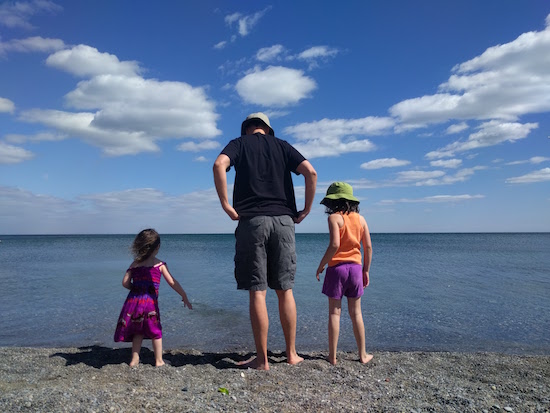
I’m not going to deny the fact that today I led my family all the way across the city because I was in pursuit of a mug. But I don’t think they suffered for it. When I learned last week that Diane Sullivan was going to be at the Beaches Arts and Crafts Festival (and that there was even such a thing as the Beaches Arts and Crafts Festival) in beautiful Kew Gardens, I knew I wanted to go, because I could pick up one of her mugs—I have one already, and it is my favourite, a birthday gift from my mom last year—and my children would be happy playing in the park, and admission to the festival was free, plus we could take a streetcar journey inspired by Andrew Larsen’s new book, The Not So Faraway Adventure.
So off we went today after Harriet’s dance class, the streetcar journey faster than we’d expected and actually painless (and not just because this is relative to our shuttle bus misadventures last weekend while the subway line was closed). Arriving at the park and having our picnic. I got to meet Diane Sullivan and indeed pick out a brand new beautiful mug which will make its #TodaysTeacup debut tomorrow. After lunch, I did some more browsing, and the children played on the climbers while Stuart read a novel: everybody was happy. Eventually I had to leave the Beaches Arts and Crafts Festival before I bought everything. And we got some fro-yo, and then walked back through the park toward the lake, the beach crowded with people enjoying the day. And we spent an hour and a bit contemplating the most glorious horizon, trying to skip stones and mostly failing, and gathering an impressive array of sea glass, which was the most perfect exercise in paying attention and appreciating the beauty in tiny ordinary things.
We took the streetcar home after a delicious dinner and gloried in the goodness of a practically perfect day, whose perfection we appreciated in particular in light of the school trip to the farm on Friday, which was perfect in its own way except that Iris threw up on me as the school bus pulled into the parking lot and I had to spend the whole day smelling like vomit. And that that day too was not without its charms is either a credit to my pathological insistence on making the best of things or evidence that I am suffering from delusions.
June 10, 2016
Eric Carle’s Dragons Dragons
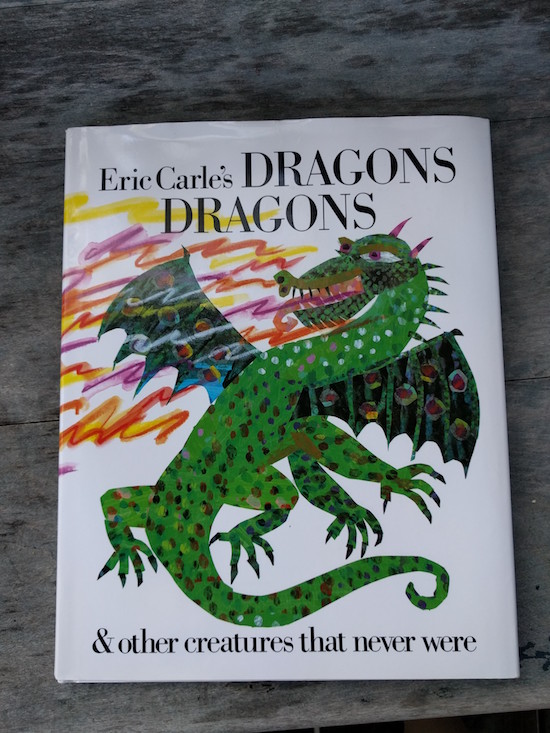
How did we live this long without knowing such a book existed as Dragons Dragons & Other Creatures That Never Were? It arrived in the mail this week, a gift from our friend Zsuzsi, whose packages usually contain books we all fall in love with. This one no exception. It’s fantastic, though you probably knew that already. It is possible that I’m last to the party in discovering this book, but on the off-chance I’m not, I want to make sure you know it too. And if you do already, let’s talk about it—isn’t it wonderful?
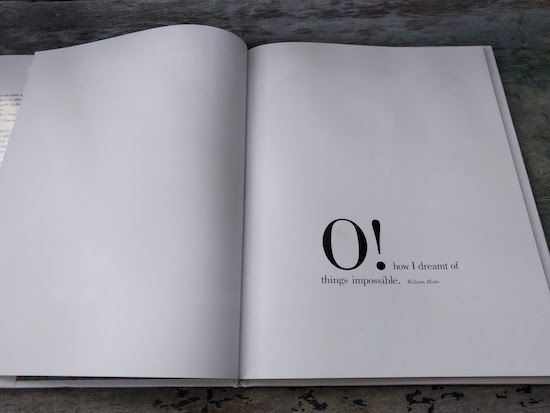
The anthology pairs poetry from a variety of sources with splendid paintings by Carle of the mythical creatures depicted within the poems. Most interestingly, the creatures come from a variety of sources as well, including from Greek Myth, First Nations stories, Hindu legend, Chinese myth and even the Bible—Levianthan.
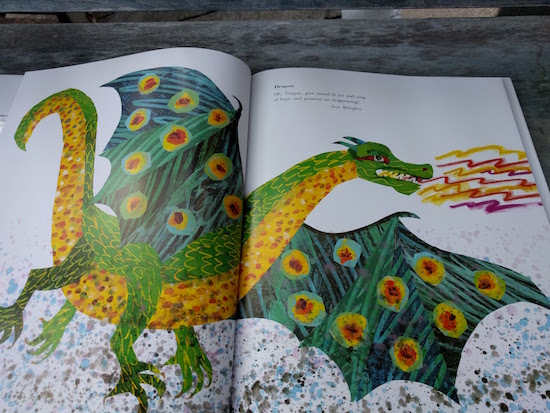
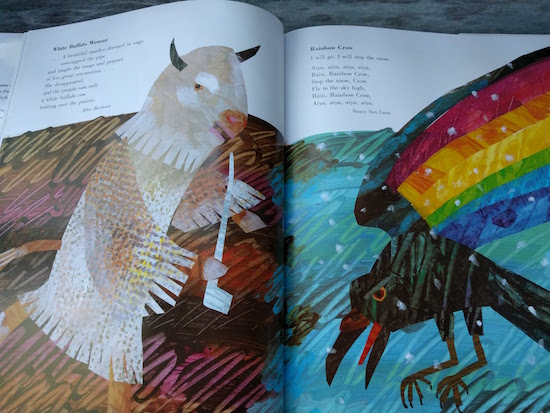
You may recall that I was a bit lost when I read Vikki VanSickle’s picture book, If I Had a Gryphon, earlier this year, because so many of the creatures in the story were ones I’d never heard of before. And so Dragons Dragons proved most illuminating, introducing these to me—krackens and chimeras—as well as many others. And if the poetry weren’t explanation enough, there is indeed a glossary in the back disclosing further details, with the most extraordinary caveat…
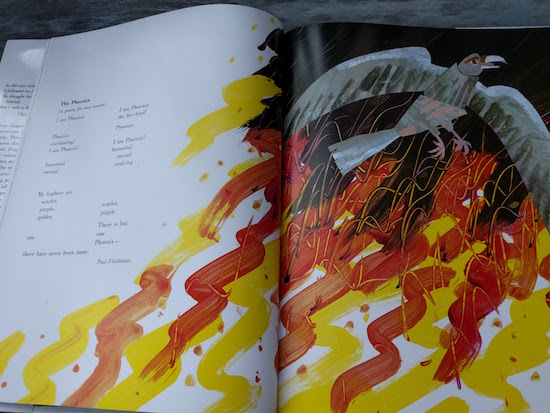
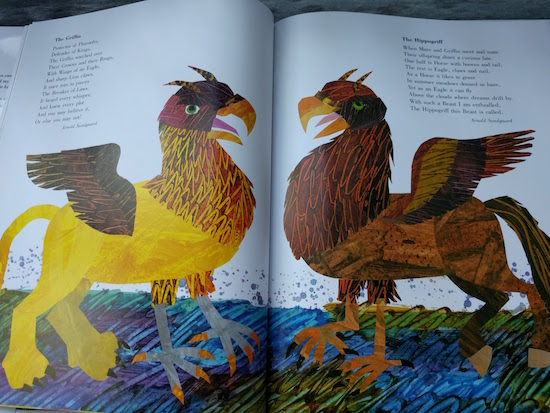
“No glossary can paint a precise picture of the likes of chimeras and dragons and basilisks. These marvellous creations can never be described definitively. Accounts of their appearance vary from source to source and tale to tale. It is appropriate that their images shift slightly in our minds with the storytelling of the moment.”
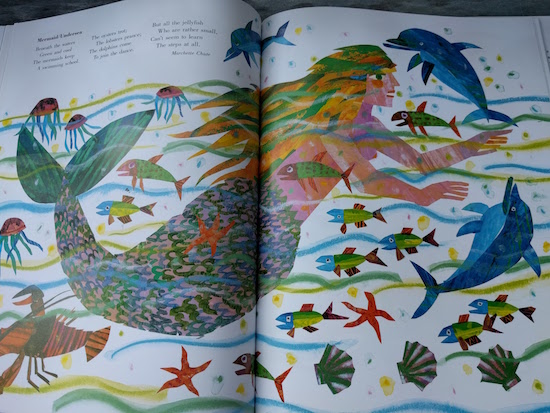
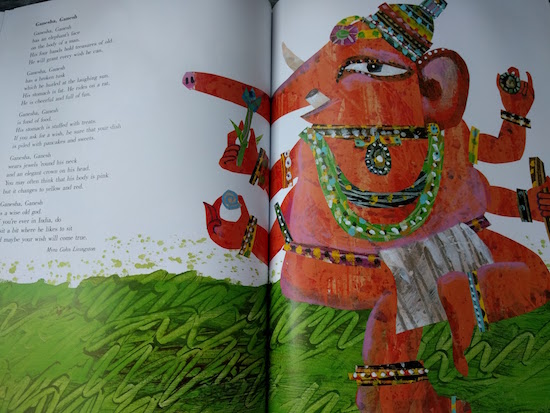
There’s also a wonderful note by anthologist Laura Whipple on the importance of mythical beasts and what their stories tell us about ourselves, our societies and our histories. “Let us allow our children to revel in the power and mystery of these magical creatures. Let them dream of things impossible.”
